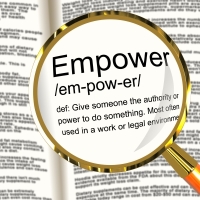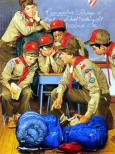 A Scout is Helpful. It’s right there in the Scout Law. Number three. A Scout cares about other people. He willingly volunteers to help others without expecting a reward.
A Scout is Helpful. It’s right there in the Scout Law. Number three. A Scout cares about other people. He willingly volunteers to help others without expecting a reward.
Except… when helping someone takes away an opportunity for them to help themselves.
Of course we want to help. But as we know, helping others doesn’t mean doing their work for them. You wouldn’t “help” your child by doing her homework, would you?
Much of the time, we are tempted to just jump in, grab the wheel and take care of a task ourselves if we feel it’s expedient, or we know how to do it better. Continue reading “The best way to help? Don’t.”


 To err is human, said the poet Alexander Pope over three hundred years ago. Everyone makes mistakes. Scouts make mistakes. In fact, the Scouting program is built partly to allow young people to safely make mistakes and learn from them. In the words of Samuel Beckett, No matter. Try again. Fail again. Fail better.
To err is human, said the poet Alexander Pope over three hundred years ago. Everyone makes mistakes. Scouts make mistakes. In fact, the Scouting program is built partly to allow young people to safely make mistakes and learn from them. In the words of Samuel Beckett, No matter. Try again. Fail again. Fail better.  A couple weeks ago, I was at a quarterly Court of Honor for one of the Scouts BSA troops in the area. I had been invited to give a Friends of Scouting presentation to the troop families. As was customary with the troop, the master of ceremonies asked each patrol’s Scouts to introduce themselves by name and rank and to tell their position of responsibility.
A couple weeks ago, I was at a quarterly Court of Honor for one of the Scouts BSA troops in the area. I had been invited to give a Friends of Scouting presentation to the troop families. As was customary with the troop, the master of ceremonies asked each patrol’s Scouts to introduce themselves by name and rank and to tell their position of responsibility. It’s said that there are three secrets to giving a presentation: Tell them what you’re going to tell them, tell them, and tell them what you told them.
It’s said that there are three secrets to giving a presentation: Tell them what you’re going to tell them, tell them, and tell them what you told them. I’ve had the opportunity to review several Eagle Scout leadership service projects over the years. Just as each Scout is different, so is their level of preparation for their projects. Some have mapped out their projects down to every screw and nail, while others give a more general description of what is being proposed or what was actually done.
I’ve had the opportunity to review several Eagle Scout leadership service projects over the years. Just as each Scout is different, so is their level of preparation for their projects. Some have mapped out their projects down to every screw and nail, while others give a more general description of what is being proposed or what was actually done.